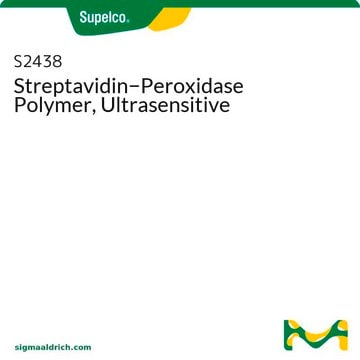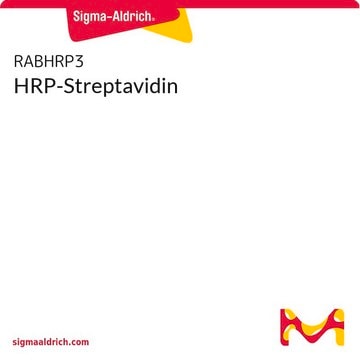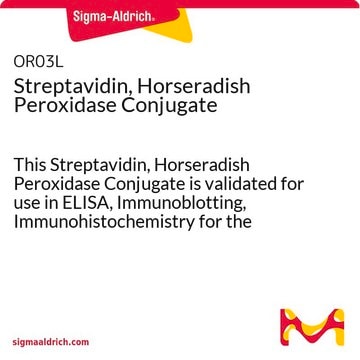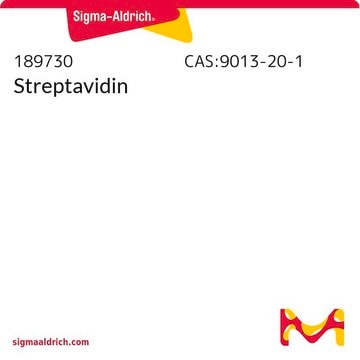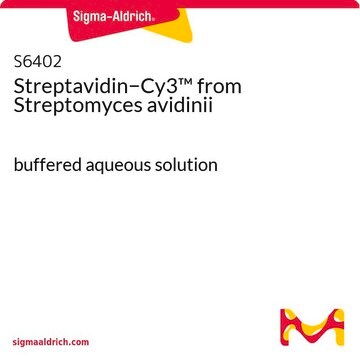S5512
Streptavidin−Peroxidase from Streptomyces avidinii
lyophilized powder
Synonym(s):
Streptavidin−HRP from Streptomyces avidinii
Sign Into View Organizational & Contract Pricing
All Photos(1)
About This Item
Recommended Products
conjugate
peroxidase conjugate
Quality Level
form
lyophilized powder
composition
Protein, ≥70% E1%/280
technique(s)
direct ELISA: 1:50,000
storage temp.
−20°C
General description
Steptavidin is coupled to horseradish peroxidase (HRP) using citrate buffer, pH 6.0, and a modified published procedure to form a 1:1 conjugate. HRP has a molecular mass of ~44kDa and steptavidin has a molecular mass of ~60kDa.
Streptavidin derives its name from its bacterial source Streptomyces avidinii and from the hen egg-white protein, avidin, which has high affinity to biotin. Its homologous core shares 33% sequence similarity with avidin, as well as sharing a common tetrameric structure. It is a crystalline tetrameric protein, with a molecular weight of 4*15000Da. It binds four molecules of biotin. Streptavidin lacks carbohydrate and sulfur-containing amino acids.
Streptavidin is considered as a high-affinity biotin-binding agent, which shows resistance to extreme pH, detergents temperature, denaturants and enzymes, hence it is used in molecular biology and bionanotechnology.
Application
Streptavidin- Peroxidase from Streptomyces avidinii has been used for ELISA (enzyme linked immunosorbent assay) and Enzyme-Linked ImmunoSpot (ELISPOT).
Streptavidin-Peroxidase from Streptomyces avidinii has used as a secondary reagent for detection of biotinylated antibodies in standard ELISA, immunoblotting, and immunocytochemistry procedures.
Biochem/physiol Actions
Streptavidin is an antibiotic that functions by binding to and depleting the essential vitamin biotin from the surrounding environment. Because of its unique properties, streptavidin has found various applications in biological studies, including immunotherapy, immunoassays, hybridization assays, lymphocyte activation, antigen localization, and affinity chromatography.
Packaging
Package size based on protein content
Physical form
Lyophilized powder containing citrate buffer salts.
Preparation Note
Labeled with Type VI peroxidase by a modification of the method of O′Sullivan, M.J., et al., FEBS Lett., 95, 311 (1978).
Purified by affinity chromatography.
Purified by affinity chromatography.
Analysis Note
The optimal working dilution should be determined empirically using a range of dilutions from a 1 mg/mL stock in buffer.
Disclaimer
Unless otherwise stated in our catalog or other company documentation accompanying the product(s), our products are intended for research use only and are not to be used for any other purpose, which includes but is not limited to, unauthorized commercial uses, in vitro diagnostic uses, ex vivo or in vivo therapeutic uses or any type of consumption or application to humans or animals.
Certificates of Analysis (COA)
Search for Certificates of Analysis (COA) by entering the products Lot/Batch Number. Lot and Batch Numbers can be found on a product’s label following the words ‘Lot’ or ‘Batch’.
Already Own This Product?
Find documentation for the products that you have recently purchased in the Document Library.
Customers Also Viewed
K G Welinder
European journal of biochemistry, 96(3), 483-502 (1979-06-01)
Horseradish peroxidase C dominates quantitatively among the isoperoxidases of horseradish root and has an isoelectric point close to 9. It consists of a hemin prosthetic group, 2 Ca2+ and 308 amino acid residues, including 4 disulfide bridges, in a single
Joana M D Portela et al.
Journal of clinical medicine, 9(1) (2020-01-18)
Cancer therapy and conditioning treatments of non-malignant diseases affect spermatogonial function and may lead to male infertility. Data on the molecular properties of spermatogonia and the influence of disease and/or treatment on spermatogonial subpopulations remain limited. Here, we assessed if
Influence of low molecular weight heparin (certoparin) and unfractionated heparin on the release of cytokines from human leukocytes.
Koller M et al
Inflammation, 25(5), 331-337 (2001)
Carmine Giorgio et al.
Biochemical pharmacology, 147, 21-29 (2017-11-14)
Eph/ephrin system is an emerging target for cancer therapy but the lack of potent, stable and orally bioavailable compounds is impairing the development of the field. Since 2009 our research group has been devoted to the discovery and development of
Polymer nanoparticles
Progress in Molecular Biology and Translational Science, 104, 299-323 (2011)
Our team of scientists has experience in all areas of research including Life Science, Material Science, Chemical Synthesis, Chromatography, Analytical and many others.
Contact Technical Service